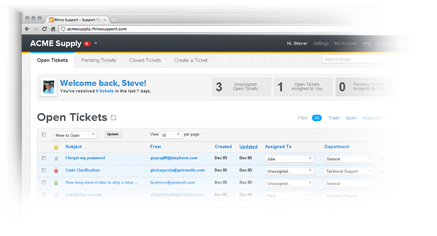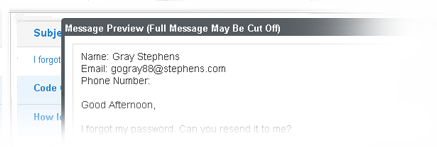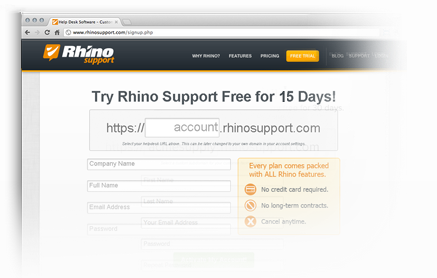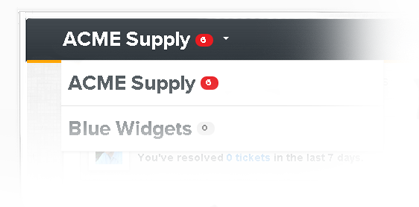Why Your Business NEEDS Our Amazing
Web Based Help Desk Management Software
Our HelpDesk Software is Designed to Save You Time
We get it. We're a software company and we know what it's like to get tickets from customers on a regular basis. We also know the importance of being able to respond to customers in a timely fashion.
That's why Rhino Support helpdesk software is designed to make the process of providing world-class support, drop-dead easy. It's fast, efficient and really easy to use.
Set up your account or read below for a quick overview.



One-Click Ticket
Management System
We pay attention to every click because we know when you're dealing with hundreds of tickets, every click counts.
Managing tickets with Rhino Support is fast, efficient and easy to use (for both you and your team). From the main control panel you'll be able to:
- View the ticket message by hovering over the subject.
- Quickly assign tickets to a user or department.
- View tickets by creation date or last activity.
- Mark as important, delete and so much more.
Set Up in Just a Few Minutes
There is no complicated "install" and you don't need a special server to use Rhino Support. It's a web-based help desk software system that can be quickly integrated into your existing business a variety of ways.
Our setup wizard will walk you through the essentials so that you can get started right away. Then if you want to incorporate some other "bells and whistles," you can.
Within a few minutes you'll be able to:- Add new support agents.
- Create new departments.
- Update company information.
- Display a floating "Support" tab on your site and more!


The Multi-Site Manager makes that super easy—all from the same dashboard.
Manage Multiple Websites
If you want to "biggie size" things, you can easily manage support for multiple websites. This is perfect for companies that want to keep support for various product lines separate but don't necessarily want to create a whole new account for each one.
Just be sure to select the plan, that comes with the innovative Multi-Site Manager option.
The Perfect Mix of Features
Why include features that most people never use? We took a different approach and
made sure the features that everyone uses are freakin' awesome!
Our philosophy is "simplicity and efficiency" because when you're dealing with dozens to hundreds of support tickets a day, you want a system that makes it easy to respond.
That's why we painstakingly review every component to ensure that each one makes the system both faster and easier to use.
OUR PRIORITIES...
Speed. A system that enables you to respond to your customers quickly.
Efficiency. A system that isn't bloated with unnecessary features. Every click counts!
Ease of Use. A system that feels natural, intuitive and easy to use.
Why Our Help Desk / Ticket System is Better
You'll Stay On-Task & Organized
Email has a tendancy to suck you in, leaving you wondering where the last hour went. A ticket system helps keeps you on-task.
All of Your Records are Centralized
The ability to quickly and acurately pull and analyze ticket trends is huge when trying to find ways to improve your product or service.
Help Prioritize Your Workflow
By prioritizing your tickets, you know where to focus your time, which is paramount when you have limited resources.
Send a Canned Response
You will find that some issues are reoccuring, or many customers may have the same issue. A canned response can save the day.
Auto Assign Tickets
Depending on the issue, you can auto assign tickets, so for instance, IT questions are routed to IT, removing you as the middle man.
You'll Speed Up Response Times
When tickets are systematically answered in an orderly fashion your response times become automatic and quicker.
